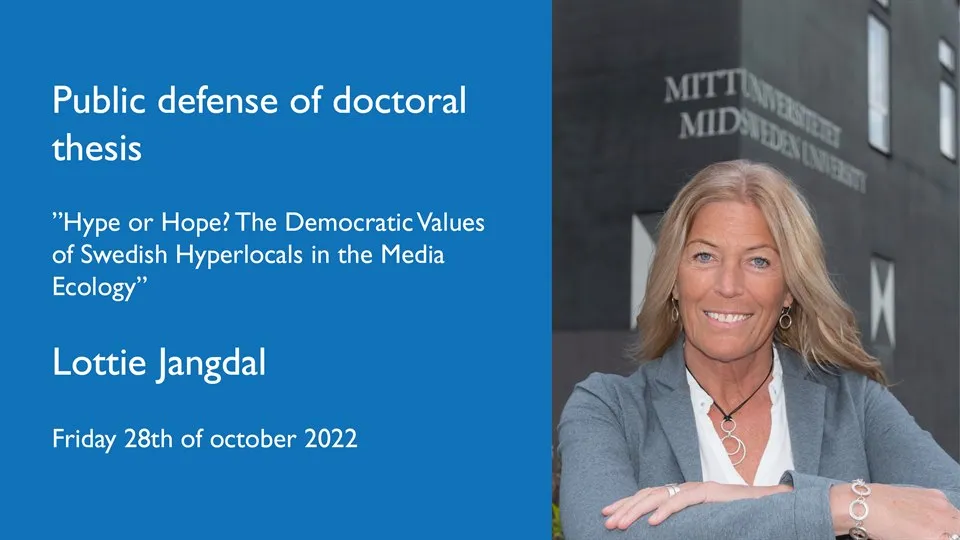Public defense of doctoral thesis in media and communication science with Lottie Jangdal
Welcome to the defense of doctoral thesis in Media and Communcation Science with Lottie Jangdal. She will present her doctoral thesis: "Hype or Hope? The Democratic Values of Swedish Hyperlocals in the Media Ecology".
Chair during the public defense: Professor Ingela Wadbring, Mid Sweden University
Main supervisor: Professor Lars Nord, Mid Sweden University
Opponent: Professor Carl-Gustav Lindén, Helsingfors University/University in Bergen
Grading committee:
Professor Paul Bjerke, College in Volda
Associate professor Sara Leckner, Malmö University
Associate professor Andreas Widholm, Stockholm University
Attend the public defense (link to Zoom)
Abstract
Local media are often credited with an integral role in the local community, tying individuals together in a shared identity or community, where local news can foster community engagement and audience participation, providing more agency in democratic processes (Lie, 2018b; Nelson & Kim, 2020; Wenzel, 2019).
This doctoral compilation thesis focuses on so-called “hyperlocal media”, which are typically citizen-led, participatory and largely independent (Turner, 2015), with content concentrated to a small geographically defined community (Radcliffe, 2012).
Earlier research about hyperlocals has mostly concentrated on presence and sustainability (Harte, Howells, & Williams, 2019), but the most relevant aspects today are not only where they exist or their financial issues. Instead, it is more interesting to analyse their democratic contributions and triangulate how they fit into today’s hybrid media system, where hyperlocal media is a comparatively new tributary in the so-called “media ecology”.
Herein, five adjacent studies aim to address areas that are less researched. Swedish hyperlocal media are studied from several vital democratic perspectives: geographic placement, media density, owner autonomy, audience interaction, source representation and civic information.
They are further analysed in the context of the main media functions as defined by a Swedish press inquiry (SOU 1995:37). The results combined clearly indicate that news from a close range has an important function in the media ecology, and that hyperlocal media can be significant to their audiences if they shoulder a gap not covered by other media providers. Positioning the hyperlocals in today’s fragmented media landscape is an important contribution of this dissertation, shedding new light on autonomous news producers and their audience in the enormous competition between information providers, including traditional media such as newspapers, TV and radio with their digital platforms, international tech giants, social media, citizens distributing content and alternative media.
